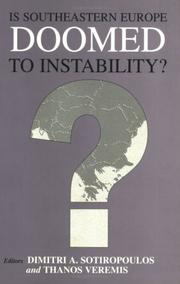| Listing 1 - 10 of 14 | << page >> |
Sort by
|
Book
ISBN: 3111355454 9783111355450 311099965X Year: 2017 Publisher: Berlin ; Boston : De Gruyter Mouton,
Abstract | Keywords | Export | Availability | Bookmark
 Loading...
Loading...Choose an application
- Reference Manager
- EndNote
- RefWorks (Direct export to RefWorks)
Book
Year: 1972 Publisher: The Hague: Mouton,
Abstract | Keywords | Export | Availability | Bookmark
 Loading...
Loading...Choose an application
- Reference Manager
- EndNote
- RefWorks (Direct export to RefWorks)
Book
Year: 1972 Publisher: The Hague Mouton
Abstract | Keywords | Export | Availability | Bookmark
 Loading...
Loading...Choose an application
- Reference Manager
- EndNote
- RefWorks (Direct export to RefWorks)
Book
Year: 1972 Publisher: The Hague, Paris Mouton
Abstract | Keywords | Export | Availability | Bookmark
 Loading...
Loading...Choose an application
- Reference Manager
- EndNote
- RefWorks (Direct export to RefWorks)
Book
Year: 1972 Publisher: The Hague, Paris Mouton
Abstract | Keywords | Export | Availability | Bookmark
 Loading...
Loading...Choose an application
- Reference Manager
- EndNote
- RefWorks (Direct export to RefWorks)
Book
Year: 1972
Abstract | Keywords | Export | Availability | Bookmark
 Loading...
Loading...Choose an application
- Reference Manager
- EndNote
- RefWorks (Direct export to RefWorks)
Digital
ISBN: 9783111355450 9783110999655 Year: 2017 Publisher: Berlin ;; Boston De Gruyter Mouton
Abstract | Keywords | Export | Availability | Bookmark
 Loading...
Loading...Choose an application
- Reference Manager
- EndNote
- RefWorks (Direct export to RefWorks)
Multi
ISBN: 9783031256097 9783031256080 9783031256103 9783031256110 Year: 2023 Publisher: Cham Springer International Publishing, Imprint: Palgrave Macmillan
Abstract | Keywords | Export | Availability | Bookmark
 Loading...
Loading...Choose an application
- Reference Manager
- EndNote
- RefWorks (Direct export to RefWorks)
This book is a "Must-Read" for those interested to grasp the fluidity of dynamics marking the Yugoslav successor states, and particularly Serbia, Montenegro and North Macedonia. The author insightfully describes how corruption, clientelism, and populism dramatically squeeze these countries in a vice grip between democratization and its reversal. The image of the "irregular pendulum of democracy" helps focusing on key mechanisms causing the backsliding of democracy in this European region. Stefano Bianchini, University of Bologna, Italy The first original contribution of this book is a productive analytical merge of populism, clientelism and corruption with specific strategies that elites employ to push democracy downhill. The second one is a refined analysis of an “irregular pendulum of democracy” in Serbia, Montenegro and North Macedonia. Sotiropoulos’ arguments are clear and convincing. His sophisticated empirical analysis is firmly based in theory and sovereign knowledge of post-Yugoslav politics. Jovan Teokarević, University of Belgrade, Serbia, and College of Europe, Belgium The author offers a lucid account of the weakening of democratic institutions in the Western Balkans and a theoretical explanation of the causal mechanisms enabling authoritarian-minded leaderships to hold on power. Drawing on democratization theory and extensive fieldwork, the book presents a deeply thought-out analytical scheme of authoritarian trends that is worth testing in other regions as well. Nikolaos Tzifakis, University of the Peloponnese, Greece This book interprets the backsliding of democracy through a metaphor, the 'irregular pendulum of democracy', suggesting that regimes may swing between liberal democracy and competitive authoritarianism. Irregular movements may occur back and forth, particularly when democracy is not consolidated. The book analyses the swing of unconsolidated democracy away from the democratic end in the cases of today’s Serbia and Montenegro and the tentative swing back towards liberal democracy in the case of North Macedonia after 2017. Dimitri A. Sotiropoulos is Professor of Political Science at the Department of Political Science and Public Administration, National and Kapodistrian University of Athens, Greece.
Political sociology --- Sociology --- Political systems --- Politics --- sociologie --- politiek --- Europese politiek --- Europe --- Comparative government. --- Europe—Politics and government. --- Political sociology. --- Comparative Politics. --- European Politics. --- Political Sociology.

ISBN: 071465289X 071468256X Year: 2002 Publisher: London Cass
Abstract | Keywords | Export | Availability | Bookmark
 Loading...
Loading...Choose an application
- Reference Manager
- EndNote
- RefWorks (Direct export to RefWorks)
International movements --- Political systems --- Balkan Peninsula
Book
ISBN: 9780191863783 9780192558725 0192558722 Year: 2020 Publisher: Oxford : Oxford University Press
Abstract | Keywords | Export | Availability | Bookmark
 Loading...
Loading...Choose an application
- Reference Manager
- EndNote
- RefWorks (Direct export to RefWorks)
This volume aims to provide an unprecedented breadth of analysis on the development of modern Greek politics, especially from the restoration of democracy in 1974 to the present day. Over forty-three chapters, contributors provide authoritative accounts of what is known about a particular area. Never before has such a volume been produced, in any language. This is not intended as a student textbook, but as a scholarly reference for all who are interested in contemporary Greece. As such, it provides a depth of analysis couched within comparative and conceptual frames, to link the case of Greece to a wider audience, especially those already familiar with a broader political science literature. In its authoritative and reflective essays, it is hoped that the volume may serve as a point of common reference for some time to come. Its essays are structured across a set of inter-connecting themes: conceptual frames by which to understand modern Greek politics; political institutions; party political traditions; political and social interests; public policy; external relations; and political leaders. With this breadth, the volume takes an eclectic approach in terms of historical, conceptual, and methodological interpretation. Its breadth offers analyses relevant not only to political science, but also economics, international relations, law, sociology, and social policy.
| Listing 1 - 10 of 14 | << page >> |
Sort by
|

 Search
Search Feedback
Feedback About UniCat
About UniCat  Help
Help News
News